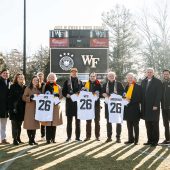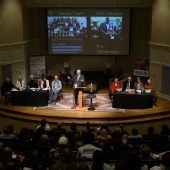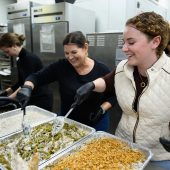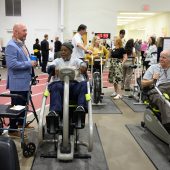German National Team Selects Winston-Salem, Wake Forest University and The Graylyn Estate as Host Site for FIFA World Cup 2026™
 The German Men’s National Team has selected Winston-Salem as its home base for the 2026 FIFA World Cup, choosing Wake Forest University and The Graylyn Estate as its official training site and team headquarters – bringing one of the world’s premier soccer programs to the Triad and placing Winston-Salem on an international stage. As part…
The German Men’s National Team has selected Winston-Salem as its home base for the 2026 FIFA World Cup, choosing Wake Forest University and The Graylyn Estate as its official training site and team headquarters – bringing one of the world’s premier soccer programs to the Triad and placing Winston-Salem on an international stage. As part…Categories: Community Impact, University Announcements

 Wake Forest University celebrated the groundbreaking today for an office building at The Grounds that will house 400 University staff when it is completed in 2027. “This place will be a hub of great energy, excitement and collaborative work,” said Executive Vice President and Chief Financial Officer Jackie Travisano. A lunchtime celebration was held at…
Wake Forest University celebrated the groundbreaking today for an office building at The Grounds that will house 400 University staff when it is completed in 2027. “This place will be a hub of great energy, excitement and collaborative work,” said Executive Vice President and Chief Financial Officer Jackie Travisano. A lunchtime celebration was held at… Two debate teams faced off at Wake Forest University on Nov. 12. All of the debaters were over the age of 70. One was about to turn 97. Inspired by the Wake Forest University Debate Team’s 2023 national championship, residents of Salemtowne Retirement Community launched their own debate society with the help of Wake Forest…
Two debate teams faced off at Wake Forest University on Nov. 12. All of the debaters were over the age of 70. One was about to turn 97. Inspired by the Wake Forest University Debate Team’s 2023 national championship, residents of Salemtowne Retirement Community launched their own debate society with the help of Wake Forest… With community partners ramping up for an increased need for Thanksgiving meals this season, the Campus Kitchen at Wake Forest University kicks off its annual TurkeyPalooza on Sunday, Nov. 16. The goal of this annual tradition: Prepare a Thanksgiving feast for those in need in Forsyth County—more than 600, at last count. Student volunteers will…
With community partners ramping up for an increased need for Thanksgiving meals this season, the Campus Kitchen at Wake Forest University kicks off its annual TurkeyPalooza on Sunday, Nov. 16. The goal of this annual tradition: Prepare a Thanksgiving feast for those in need in Forsyth County—more than 600, at last count. Student volunteers will… Hundreds of kids will trick-or-treat around Wake Forest University’s Benson University Center from 3-6 p.m. Tuesday, Oct. 28, for the annual Project Pumpkin fall festival, a University student-led event to bring together students, faculty, staff and Winston-Salem communities. Media are invited to attend. Please contact media@wfu.edu to confirm plans to visit. Check-in will be at…
Hundreds of kids will trick-or-treat around Wake Forest University’s Benson University Center from 3-6 p.m. Tuesday, Oct. 28, for the annual Project Pumpkin fall festival, a University student-led event to bring together students, faculty, staff and Winston-Salem communities. Media are invited to attend. Please contact media@wfu.edu to confirm plans to visit. Check-in will be at… Jill Tiefenthaler, chief executive officer of the National Geographic Society, will deliver the keynote address for the Sabin Center for Environment and Sustainability’s conference, “Sustainable, Just, & Abundantly Wild: Effective Action at Every Scale,” on Nov. 13 at Wake Forest University.
Jill Tiefenthaler, chief executive officer of the National Geographic Society, will deliver the keynote address for the Sabin Center for Environment and Sustainability’s conference, “Sustainable, Just, & Abundantly Wild: Effective Action at Every Scale,” on Nov. 13 at Wake Forest University.
 For 50 years and counting, a program founded at Wake Forest University has helped thousands of people live longer, healthier lives. Among them is Tom Mullen, the dean of the college from 1968 to 1995, who along with his wife, Ruth, works out three times a week with the Healthy Exercise & Lifestyle Programs (HELPS),…
For 50 years and counting, a program founded at Wake Forest University has helped thousands of people live longer, healthier lives. Among them is Tom Mullen, the dean of the college from 1968 to 1995, who along with his wife, Ruth, works out three times a week with the Healthy Exercise & Lifestyle Programs (HELPS),… Wake Forest University’s annual Hit the Bricks fundraiser inspired a record number of runners and walkers—more than 2,264—to circle Hearn Plaza on Oct. 1 in support of the Brian Piccolo Cancer Research Fund. In fact, no other student-led fundraiser at Wake Forest has attracted as many participants. This year's Hit the Bricks runners, representing a…
Wake Forest University’s annual Hit the Bricks fundraiser inspired a record number of runners and walkers—more than 2,264—to circle Hearn Plaza on Oct. 1 in support of the Brian Piccolo Cancer Research Fund. In fact, no other student-led fundraiser at Wake Forest has attracted as many participants. This year's Hit the Bricks runners, representing a… Faith Martin is hitting the bricks Oct. 1 for Izzy, her younger sister and best friend, who lost her life to osteosarcoma in 2022, just two years after her diagnosis. Because raising money to support cancer research could make all the difference in someone’s life, events like Wake Forest University’s Hit the Bricks are so…
Faith Martin is hitting the bricks Oct. 1 for Izzy, her younger sister and best friend, who lost her life to osteosarcoma in 2022, just two years after her diagnosis. Because raising money to support cancer research could make all the difference in someone’s life, events like Wake Forest University’s Hit the Bricks are so… Wake Forest University’s Educating Character Initiative (ECI) will expand its support for character education at colleges and universities across the country with more than $30 million in new funding from Lilly Endowment Inc. The ECI has built a community of educators from more than 400 higher education institutions engaged in developing and implementing ideas for integrating character education on their campuses.
Wake Forest University’s Educating Character Initiative (ECI) will expand its support for character education at colleges and universities across the country with more than $30 million in new funding from Lilly Endowment Inc. The ECI has built a community of educators from more than 400 higher education institutions engaged in developing and implementing ideas for integrating character education on their campuses.